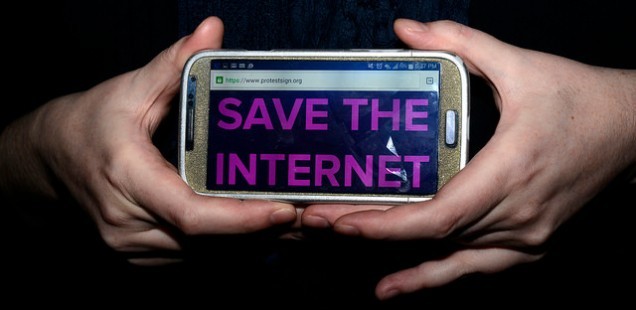Di seguito il resoconto ricevuto dal PP brasiliano, organizzatore di IUF Brasil 2015
[ENGLISH VERSION]
Gabriela Coleman, Julia Reda, Birgitta Jónsdóttir, Theo Oliveira, Adriano Belisario, Danny O’brien and Pirates of the Seven Seas passed through the Internet disgovernance Forum, parallel to the IGF, held in João Pessoa. The IUF began on Monday 09 and ended on Friday, November 13th.
9/11
The event took place at the auditorium of 411 CCHLA UFPB and started
with the presentation of the IUF video, exposing the motives for the
realization of the event in parallel to the IGF.
Then remotely Pirate James in Rio de Janeiro, spoke about the
violations and illegalities in the process of 23 political prisioners
‘#23PresosPolíticos’ – when it became apparent the tactics used by the
State to silence and blame people after the June 2013 protest journeys.
Right after the speech of James, anthropologist Gabriela Coleman gave
a presentation regarding the benefits of anonymity in a democratic
society. She also told us a bit about the history of Anonymous,
especially in the United States, and about the arrests and persecutions
that hacktivists faced in North America and Europe.
Complemented by the fact that in Brazil, there are militants who had
their personal secrecy and violated their privacy and were arrested and
prosecuted only for managing one Anonymous Facebook page. The legal
process aberrations can be analyzed now that the case files were
publicized.
After the presentation, there was room for questions, interventions
and ended up experiencing a debate about privacy and anonymity on the
Internet.
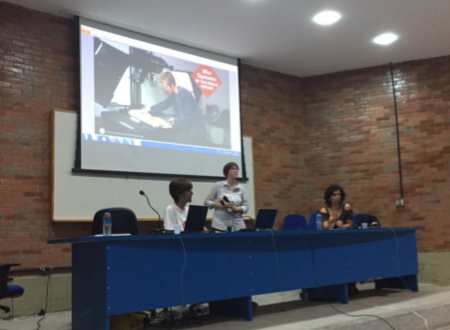 Finally, the MEP (Member of the European Parliament) Julia Reda
closed the first day of the event, talking about his role in the
European parliament. She acknowledged that her work on reform of
copyright by the European Parliament displeased many pirates. However,
she pointed out that legislative action is part of the pirate movement
performance – and that stands out from the others by a globally active
parties and activists.
When asked by the audience whether the system is the main cause for
the problems than would it not be more adequate a change in the
consciousness of society rather than legislate? ‘. She said: “If you
believe the system is corrupt in its entirety and nothing can be
improved within it then it would not make sense to be in a party [even
though a Pirate one].”
Finally, the MEP (Member of the European Parliament) Julia Reda
closed the first day of the event, talking about his role in the
European parliament. She acknowledged that her work on reform of
copyright by the European Parliament displeased many pirates. However,
she pointed out that legislative action is part of the pirate movement
performance – and that stands out from the others by a globally active
parties and activists.
When asked by the audience whether the system is the main cause for
the problems than would it not be more adequate a change in the
consciousness of society rather than legislate? ‘. She said: “If you
believe the system is corrupt in its entirety and nothing can be
improved within it then it would not make sense to be in a party [even
though a Pirate one].”
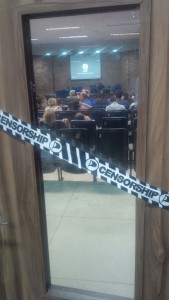
10/11 On Tuesday the Pirate Birgitta Jonsdotter, parliamentary Iceland and most likely person to take over as the next Prime Minister in the country. Birgitta spoke about a resolution of her own adopted at IPU (Inter-Parliamentary Union). The resolution calls on parliamentarians to strive for measures to protect whistleblowers calling for an end to censorship, online restrictions, monitoring or any type of repression against journalists. She Invited the parliamentarians of the IPU to support both the provision of government accounts and the private sector for human rights violations, such as the right to physical and psychological integrity, the right to privacy, freedom of speech and other individual freedoms. Such accountability are necessary because the principle of transparency must be established, since the understanding of this document, become lawful knowledge about: appropriate sanctions to ensure justice and to act as a deterrent, criminal cases, administrative fines, suspension or withdrawal of business licenses, and the payment of compensation to individuals for damage. The poet was not able to answer many questions due to her strict schedule, but blew a kiss and left wishes of love to all Pirates at the disgovernance Forum. After that the philosophy professor, Theo Oliveira of the Federal University of Paraíba – UFPB Campus IV, gave a presentation in defense of freedom of knowledge sharing through virtual networks and analyzed the need to reflect on the exposed issues the Pirate Party from a philosophical point of view. Listed the concepts of enlightenment definition (Aufklarung) Kant and the criticisms made by Adorno and Horkheimer, and also pointed out Habermas’s proposal of Communicative Action emphasizing the need for all the Pirates, reflecting a new form of social interaction and language through the virtual network .
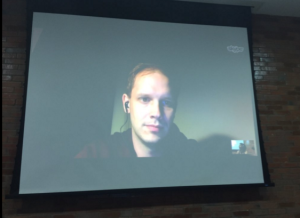
11/11
Peter Sunde, one of the founders of Pirate Bay (the most resilient
torrent site in the world) would speak on the third day of the IUF, but
due to technical reasons his presentation had to be canceled.
The next presentation was a journalist and activist Adriano
Belisario, Copyfight book organizer. Belisario began his speech, joking:
“this is very formal disgovernance forum”! He decided to have a more
informal talk rather than give a lecture in a formal manner.
As an Old Pirate Party member, Belisario talked about Copyfight – a
book which showed that the key issues involving copyright go far beyond
the digital universe, “When someone like Peter Sunde is arrested, he is a
famous figure and receives solidarity from around the world . But there
is no difference between him and the ‘camelô’ (street sellers)
suffering aggression in the streets of Rio de Janeiro. “
Following the inspiration of the Occupy protest under the slogan “We
are the 99%” Belisario talked about a project under the name “Owners of
Brazil.” Doing data analysis of large Brazilian companies, it sought to
identify the “1%”. It found that just over 150 companies have 50% of the
national GDP. These are the ones that receive more money from BNDES and
also the ones that make more donations to political campaigns. The
platform was developed in an open and all its documentation can be
accessed at: proprietariosdobrasil.org.br/
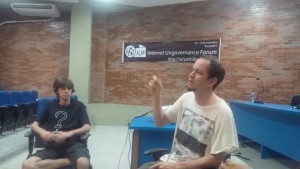 In Brazil we discuss the implementation of a standard digital radio
signal. There are two models in dispute: the owner, limited and closed
or an open source signal, such as digital radio mondiale. The spectrum
is free to release and use of electro magnetic tracks, without prior
licenses. This may represent a paradigm shift, a post-internet. You may
also become a server, or a relay, not seen relays servers. Experiences
with the ‘digital world radio’ transmitting voice and data between
Amazonian tribes. In Mexico in a community it was tested an antenna that
allowed a whole community to use their phones to communicate without
the use of telecommunications companies without approval or help from
governments.
In Brazil we discuss the implementation of a standard digital radio
signal. There are two models in dispute: the owner, limited and closed
or an open source signal, such as digital radio mondiale. The spectrum
is free to release and use of electro magnetic tracks, without prior
licenses. This may represent a paradigm shift, a post-internet. You may
also become a server, or a relay, not seen relays servers. Experiences
with the ‘digital world radio’ transmitting voice and data between
Amazonian tribes. In Mexico in a community it was tested an antenna that
allowed a whole community to use their phones to communicate without
the use of telecommunications companies without approval or help from
governments.
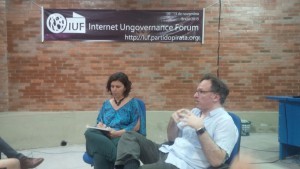
12/11 The IUF received Danny O’Brien, who is a international director at the EFF, Electronic Frontier Foundation, a nonprofit organization that fights mass surveillance and the fight for Internet privacy. Danny was in the same basement with Bram Cohen when the torrent was created. His stance at the time, represented a decisive revolution and a drastic change in the application and in the culture of sharing on the Internet. One of the most important points on the picked up information in conversation with Danny, was that at one point, when asked about the chances of paradigm shift on the control and vigilantism in information systems, he said that one does not necessarily need a complex structure to exit from the bonds of large corporations. What we need is to build new roads, through the free networks and organize actions financed independent policies of governments and companies, collaboratively (crowndfunding) in order to legally challenge unconstitutional laws and provide free access to knowledge for all those who want to learn about the knowledge sharing Danny O`brien also talked abou Bassel, a free software activist who has been arrested for three years in Siria and might be sentenced to death. He asked activists to press governments that still mantain contact with Assad Dictatorship like Brazil to ask Bassel to be forgiven At the end of his speech O’Brien and forum participants made a provocation that in Brazil, as in most of the world, we have shitty parties, shitty internet and shitty civilian organizations. ‘What do you have to lose ?’, he said.
Let us create Pirate Parties. Lets create Free Networks, Internet providers. We create organizations without ties to governments and corporations. We are free! What we have to lose?

